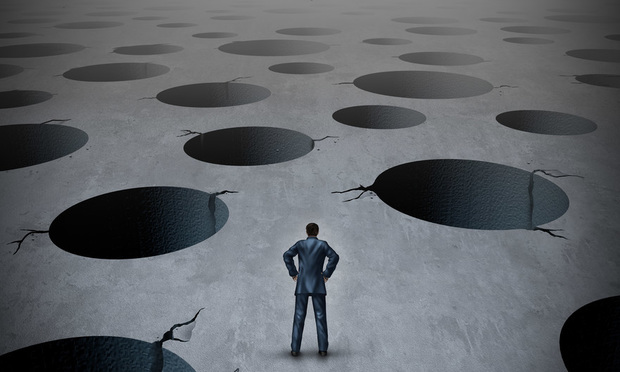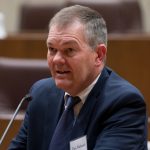Health & Habeas: A Constitutional Crisis Is Quietly Brewing Amid Coronavirus Chaos
On one hand, attorneys are relieved. They say court closures minimize their own exposure to the coronavirus. But on the other, a gnawing worry tempers that relief.
March 17, 2020 at 10:15 PM
7 minute read
The original version of this story was published on Law.com
 Photo: Lightspring/Shutterstock.com
Photo: Lightspring/Shutterstock.com
In the Northern District of California, where new criminal trials are suspended until at least May 1, at least one federal magistrate judge invited criminal defendants to ask him to reconsider his pretrial detention determinations. Monday, as six Bay Area counties were preparing to implement "shelter in place" policies to slow the spread of the coronavirus, U.S. Magistrate Judge Nathanael Cousins issued a new standing order.
"This standing order sets forth the procedure for any request to reopen a detention hearing on the basis of the physical and mental condition of the accused," wrote Cousins, noting that the order only applied to his own cases. "This public health crisis is serious and urgent. Counsel should not delay in evaluating whether any defendant should have his or her detention hearing reopened," he wrote.
The court's website, where the Northern District's judges typically post standing orders, does not include a similar order for any of the court's 11 other magistrate judges.
Across the country, one day before alarms over COVID-19's spread prompted the chief judge of Georgia's largest judicial circuit to curtail court operations, Atlanta attorney Georgia Lord sent him an urgent message.
Lord was worried. Fulton County's superior and state courts were continuing to pack hundreds of lawyers, their clients, witnesses and potential jurors into crowded calendar calls and jury assembly rooms, often for hours at a time. Lord urged Superior Court Judge Christopher Brasher to take "immediate significant steps" to prevent court operations from becoming "a launching pad" for the coronavirus' potential spread.
That concern has spread nationwide. Lawyers who are used to spending hours in packed courtrooms and on courthouse security lines across the country are now sounding the alarm. In jurisdictions where judges haven't curtailed operations, attorneys worry about making in-person appearances amid the growing health threat.
But in other parts—where judges have shuttered state and federal courts—a different concern: constitutional issues arising from the delays.
On one hand, attorneys are relieved. They say court closures minimize their own exposure to the coronavirus. But on the other, a gnawing worry tempers that relief. Attorneys say the suspension of jury trials, legal deadlines and statutes of limitations will harm—perhaps fatally—clients incarcerated in often overcrowded, less than sanitary jails and prisons.
'Serious and Urgent'
Atlanta criminal defense lawyer Drew Findling called the question of what to do about people in custody "a staggering issue" and "a ticking time bomb."
 U.S. Magistrate Judge Nathanel Cousins
U.S. Magistrate Judge Nathanel Cousinsin the Northern District of California, Cousins didn't appear from a search of public dockets to have any immediate takes on the new procedure he outlined to review his pretrial detention decisions. But the judge further let his concerns be known in a separate class action he's overseeing concerning inmate medical and psychiatric care at Santa Rita Jail in Alameda County. Cousins indicated to the parties that he was willing to spend court time addressing concerns at the jail on an expedited basis.
"This notice alerts the parties that I am available to assist in protecting the health and safety of the class," Cousins wrote in an order issued Monday. "The purpose of this order is not to distract or criticize efforts that are already underway, but to provide one procedural path toward faster, classwide action amid this global and community crisis. Counsel are ordered to confer with each other before responding to this notice. A collaborative response would likely be more effective than a contested one," the judge wrote.
In Texas, Supreme Court Chief Justice Nathan Hecht, who is also president of The Conference of Chief Justices, said he is "completely sympathetic" with lawyers' concerns about overcrowded hearings.
"Courts have to try to make sure that people that are participating in hearings—lawyers, court staff, parties, the judge himself—are protected," Hecht said.
'Just Want to Get Out of Jail'
On Tuesday, Atlanta lawyer Findling called on prosecutors and public defenders to begin jointly consulting with judges to release misdemeanor and non-violent felony offenders unable to post bond on signature or partial-payment bonds.
And Lawrence Zimmerman, president of the Georgia Association of Criminal Defense Lawyers, said he has been on the phone since March 13 with judges, prosecutors and lawyers across the state "to get people out of jail as quickly as possible in the most reasonable and orderly fashion."
At the same time, Zimmerman said, some defense lawyers are worried their clients are taking plea deals "because they are under arrest and just want to get out of jail and be with their loved ones."
Special report: As Coronavirus Spreads, Legal Industry Shifts Into Crisis Management Mode
But jurists too appear to be overwhelmed.
A March survey of 316 judges by The National Judicial College—a 12,000-member, national educational institution for judges—found that nearly 60% of respondents said they do not feel adequately prepared to make decisions related to the coronavirus. Survey respondents said their concerns revolve around weighing personal rights against public safety, ensuring that courts continue operations, deciding whether to loosen evidence rules, and more.
One respondent said judges aren't getting enough information or guidance from the leaders of their state judiciary. Other judges are worried that they don't know how to address questions involving convictions, bond release and other custody issues, if jail populations become infected. The judges surveyed were also keenly aware that their courts frequently come into contact with vulnerable populations without good access to health care, and that the virus may easily spread to court staff and juries.
Civil Courts Too
The questions over process during a pandemic extend beyond criminal to civil matters as well.
For instance, a Gwinnett County state court judge in Georgia on Tuesday suspended an ongoing civil jury trial. The judge had initially refused to do so, even after jurists in half the state's 49 judicial circuits suspended operations, or closed their courthouses.
Defense lawyers in that ongoing products liability case had first sought to suspend the trial Sunday night, after Georgia Supreme Court Chief Justice Harold Melton declared a statewide judicial emergency March 14.
But Judge Emily Brantley denied their request. When defense lawyers filed an emergency mandamus petition with the state Supreme Court on Monday, and the plaintiffs rested their case, the judge reconsidered her stance.
Brantley staff attorney David Abercrombie said Tuesday that despite Melton's emergency declaration, "It appeared the court [Brantley] still had discretion to continue the jury trial to conclusion."
"We brought the jurors in Monday, and they all unanimously agreed to continue. And we brought in a cleaning crew to disinfect the entire courtroom, jury room and deliberation areas," he said. Brantley also did her own legal research Monday night about the growing viral threat "and notified us early this morning [Tuesday] that she would be staying the case," Abercrombie said.
Meanwhile, judges acknowledge uncertainty in the virus' wake.
In Tulsa, Oklahoma, U.S. District Judge Claire Eagan, the chairwoman of the executive committee of the Judicial Conference of the United States, on Tuesday called the situation "very fluid."
"We have a unique role because we have to uphold the rule of law and keep the courthouses open," she said. "But we have to protect the public and our employees."
Kathryn Hayes Tucker in Atlanta contributed to this report.
This content has been archived. It is available through our partners, LexisNexis® and Bloomberg Law.
To view this content, please continue to their sites.
Not a Lexis Subscriber?
Subscribe Now
Not a Bloomberg Law Subscriber?
Subscribe Now
NOT FOR REPRINT
© 2025 ALM Global, LLC, All Rights Reserved. Request academic re-use from www.copyright.com. All other uses, submit a request to [email protected]. For more information visit Asset & Logo Licensing.
You Might Like
View All
Apple Files Appeal to DC Circuit Aiming to Intervene in Google Search Monopoly Case
3 minute read


Federal Judge Pauses Trump Funding Freeze as Democratic AGs Plan Suit
4 minute readTrending Stories
- 1Gunderson Dettmer Opens Atlanta Office With 3 Partners From Morris Manning
- 2Decision of the Day: Court Holds Accident with Post Driver Was 'Bizarre Occurrence,' Dismisses Action Brought Under Labor Law §240
- 3Judge Recommends Disbarment for Attorney Who Plotted to Hack Judge's Email, Phone
- 4Two Wilkinson Stekloff Associates Among Victims of DC Plane Crash
- 5Two More Victims Alleged in New Sean Combs Sex Trafficking Indictment
Who Got The Work
J. Brugh Lower of Gibbons has entered an appearance for industrial equipment supplier Devco Corporation in a pending trademark infringement lawsuit. The suit, accusing the defendant of selling knock-off Graco products, was filed Dec. 18 in New Jersey District Court by Rivkin Radler on behalf of Graco Inc. and Graco Minnesota. The case, assigned to U.S. District Judge Zahid N. Quraishi, is 3:24-cv-11294, Graco Inc. et al v. Devco Corporation.
Who Got The Work
Rebecca Maller-Stein and Kent A. Yalowitz of Arnold & Porter Kaye Scholer have entered their appearances for Hanaco Venture Capital and its executives, Lior Prosor and David Frankel, in a pending securities lawsuit. The action, filed on Dec. 24 in New York Southern District Court by Zell, Aron & Co. on behalf of Goldeneye Advisors, accuses the defendants of negligently and fraudulently managing the plaintiff's $1 million investment. The case, assigned to U.S. District Judge Vernon S. Broderick, is 1:24-cv-09918, Goldeneye Advisors, LLC v. Hanaco Venture Capital, Ltd. et al.
Who Got The Work
Attorneys from A&O Shearman has stepped in as defense counsel for Toronto-Dominion Bank and other defendants in a pending securities class action. The suit, filed Dec. 11 in New York Southern District Court by Bleichmar Fonti & Auld, accuses the defendants of concealing the bank's 'pervasive' deficiencies in regards to its compliance with the Bank Secrecy Act and the quality of its anti-money laundering controls. The case, assigned to U.S. District Judge Arun Subramanian, is 1:24-cv-09445, Gonzalez v. The Toronto-Dominion Bank et al.
Who Got The Work
Crown Castle International, a Pennsylvania company providing shared communications infrastructure, has turned to Luke D. Wolf of Gordon Rees Scully Mansukhani to fend off a pending breach-of-contract lawsuit. The court action, filed Nov. 25 in Michigan Eastern District Court by Hooper Hathaway PC on behalf of The Town Residences LLC, accuses Crown Castle of failing to transfer approximately $30,000 in utility payments from T-Mobile in breach of a roof-top lease and assignment agreement. The case, assigned to U.S. District Judge Susan K. Declercq, is 2:24-cv-13131, The Town Residences LLC v. T-Mobile US, Inc. et al.
Who Got The Work
Wilfred P. Coronato and Daniel M. Schwartz of McCarter & English have stepped in as defense counsel to Electrolux Home Products Inc. in a pending product liability lawsuit. The court action, filed Nov. 26 in New York Eastern District Court by Poulos Lopiccolo PC and Nagel Rice LLP on behalf of David Stern, alleges that the defendant's refrigerators’ drawers and shelving repeatedly break and fall apart within months after purchase. The case, assigned to U.S. District Judge Joan M. Azrack, is 2:24-cv-08204, Stern v. Electrolux Home Products, Inc.
Featured Firms
Law Offices of Gary Martin Hays & Associates, P.C.
(470) 294-1674
Law Offices of Mark E. Salomone
(857) 444-6468
Smith & Hassler
(713) 739-1250






